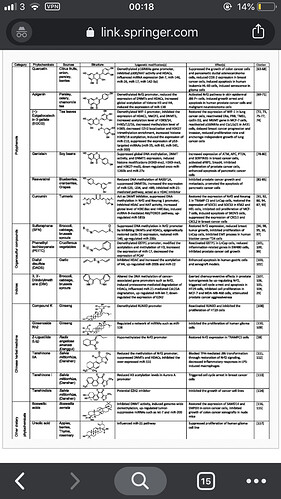Starting this thread for everything epigenetics.
Awesome website for epigenetic learning material:
It is up-to-date with current understanding of the subject.
Thank you
This seems intriguing.
oh my god
Moving leaps and bounds in a couple years. This discusses a publication from Dec. 2017:
The genome editing tool, Casilio, can be used to efficiently remove methyl groups from DNA and activate expression of methylation-silenced genes in experimental systems.
And awor posted the prime editor which is much more precise and effective than crispr now.
Axolotl posted studies where targeted demethylation was accurately achieved. These tools are coming along fast now. You’ll see them being used in sickle cell studies and cancer treatment I soon
We have to find what genes and how they got methylated. If we don’t, then soon all the stuff we need will just be available for us without knowing where to apply it
Nuclear receptors also represent important non-histone targets for acetylation and deacetylation. Acetylation of the androgen receptor (AR) by p300/CBP and TIP60 at multiple lysines in the DNA binding domain enhances hormone-dependent transactivation, whereas deacetylation of AR by HDAC1 represses its function. Further, ubiquitination by MDM2 occurs upon removal of acetylation on AR14. Interestingly, in chronic obstructive pulmonary disease (COPD) and other lung pathologies, it is loss of HDAC2, not HDAC1, that is implicated in excessive GR signaling pathways7, 21, 22
In addition to transcription factors and nuclear receptors, the cytoskeletal protein α-tubulin is a well-recognized non-histone target for acetylation. Deacetylation of α-tubulin by HDAC6 and SIRT2 induces cell motility and enhances microtubule depolymerization23–25. HDAC8 also associates with β-actin and, via changes in its acetylation status, regulates smooth muscle contractility.
Interesting follow up:
Edit: Warning- There is a lot of supplements on this list that people have had severe reactions from so best to look up on search bar on PH to see if there has been any interactions.
That chart is absolutely amazing.
Maybe we should pick the ones that are not anti androgenic at the same time.
Apigenin is an aromatase inhibitor but also estrogenic itself.
I’d say quercetin, apeginin and garlic are the safest? Thoughts?
Curcumin looks promising but it’s quite the DHT inhibitor
Soy looks good on paper but way too anti androgenic
Damon got PFS because of Quercetin. Not safe at all…
My condition severely worsened after taking garlic extract. Food for thought!
I think I mentioned BHB or exogenous keto bodies in another thread. Look up sources of naturally occurring butyrate but watch out for antiandrogens. I crashed and I’m persistently worse from taking Navitas brand cacao nibs which are packed to the brim with the stuff shown in Papasmurf’s chart as it’s highly antiandrogenic.
Also be extremely careful not to have your blinders on in trying to get better when it comes to taking man-made substances or drugs to disrupt essential global processes in the body (sound familiar?). Things can get unimaginably worse. Harm reduction should be our number one goal. I’m just going to crib this from a reddit user km1116:
Well, some (e.g., HDAC inhibitors) work for very specific cancer subtypes (e.g., some leukemias/lymphomas). But for the most part, they do not. Some are now being added to existing cocktails, with minor effect. The problem with them, I believe, is that they are (i) terrible non-specific, and (ii) genotoxic.
(i) the idea that one can “reset” “epigenetic” changes to gene expression is founded on two assumptions. First, that the aberrantly-expressed gene can be fixed without altering much/any thing else. So far, not true. In fact, the intended gene seems to be one of the least responsive. That’s sensible, actually, because we know that genes are not controlled by DNA methylation or histone modifications, which are the intended targets of these compounds. Usually the altered gene expression is one of hundreds of altered genes, and it’s misregulation is caused by bona fide mutations in enhancer/promoters, or in upstream genes. That’s the second point: epigenetics as the idea that changes to gene expression are set and maintained by changes to histone/DNA methylation is wrong. Those chromatin changes are downstream of transcription factors and enhancers, which are the cause of the observed gene mi-sexpressions in cancer.
(ii) “epigenetic” drugs disrupt heterochromatin. They therefore deregulate transposable elements, alter telomere length, cause rDNA misregulation and instability, and cause DNA damage in the satellite DNAs. All of those have negative consequences, in fact are contributing to other cancers. We do not yet know, but can strongly predict, that those that take these drugs will have many broad secondary cancers.
In short, drugs that target “epigenetic” phenomena are prone to the same fallacy as “epigenetics” itself. If you don’t understand how the underlying phenomenon works, you’re likely to cause as much harm as you’re fixing. And I’d say that peoples’ view of epigenetics still is pretty close to “magical” thinking (e.g., transgenerational inheritance, retention through mitosis, all of the regulatory changes without mutation, it’s role in evolution and ecology, etc), so it’s not a shock that the drugs are expected to act as magical pills. And they have not been very magic. In fact, the number one description I’ve heard used to describe drugs that target histone methylation is “disappointing.” And most drugs that affect DNA methylation are just too toxic to use on people.
[/quote]
Probably you should have eaten the actual garlic, not that processed shit they are selling man.
It is for this reason they I feel we should be looking for treatments rather than genetic/epigenetic ‘cures’ that so many members are advocating.
It’s far too risky and such treatments are still in their early infancy. Despite all the talk of rapid progress in such techniques, our knowledge of long term consequences are scant and will likely take many years to fully understand.

